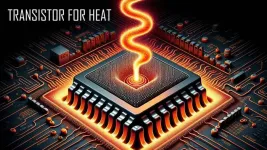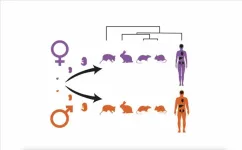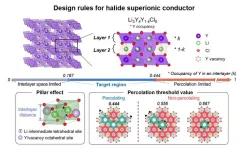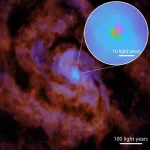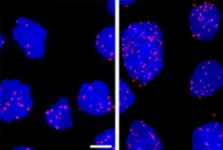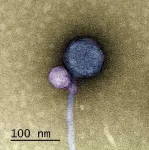(Press-News.org) A team of researchers from UCLA has unveiled a first-of-its-kind stable and fully solid-state thermal transistor that uses an electric field to control a semiconductor device’s heat movement.
The group’s study, which will be published in the Nov. 3 issue of Science, details how the device works and its potential applications. With top speed and performance, the transistor could open new frontiers in heat management of computer chips through an atomic-level design and molecular engineering. The advance could also further the understanding of how heat is regulated in the human body.
“The precision control of how heat flows through materials has been a long-held but elusive dream for physicists and engineers,” said the study’s co-author Yongjie Hu, a professor of mechanical and aerospace engineering at the UCLA Samueli School of Engineering.” This new design principle takes a big leap toward that, as it manages the heat movement with the on-off switching of an electric field, just like how it has been done with electrical transistors for decades.”
Electrical transistors are the foundational building blocks of modern information technology. They were first developed by Bell Labs in the 1940s and have three terminals — a gate, a source and a sink. When an electrical field is applied through the gate, it regulates how electricity (in the form of electrons) moves through the chip. These semiconductor devices can amplify or switch electrical signals and power. But as they continue to shrink in size over the years, billions of transistors can fit on one chip, resulting in more heat generated from the movement of electrons, which affects chip performance. Conventional heat sinks passively draw heat away from hotspots, but it has remained a challenge to find a more dynamic control to actively regulate heat.
While there have been efforts in tuning thermal conductivity, their performances have suffered due to reliance on moving parts, ionic motions, or liquid solution components. This has resulted in slow switching speeds for heat movement on the order of minutes or far slower, creating issues in performance reliability as well as incompatibility with semiconductor manufacturing.
The new thermal transistor, which boasts a field effect (the modulation of the thermal conductivity of a material by the application of an external electric field) and a full solid state (no moving parts), offers high performance and compatibility with integrated circuits in semiconductor manufacturing processes. The team’s design incorporates the field effect on charge dynamics at an atomic interface to allow high performance using a negligible power to switch and amplify a heat flux continuously.
The UCLA team demonstrated electrically gated thermal transistors that achieved record-high performance with switching speed of more than 1 megahertz, or 1 million cycles per second. They also offered a 1,300% tunability in thermal conductance and reliable performance for more than 1 million switching cycles.
“This work is the result of a terrific collaboration in which we are able to leverage our detailed understanding of molecules and interfaces to make a major step forward in the control of important materials properties with the potential for real-world impact,” said co-author Paul Weiss, a professor of chemistry and biochemistry. “We have been able to improve both the speed and size of the thermal switching effect by orders of magnitude over what was previously possible."
In the team’s proof-of-concept design, a self-assembled molecular interface is fabricated and acts as a conduit for heat movement. Switching an electrical field on and off through a third-terminal gate controls the thermal resistance across the atomic interfaces and thereby allowing heat to move through the material with precision.
The researchers validated the transistor’s performance with spectroscopy experiments and conducted first-principles theory computations that accounted for the field effects on the characteristics of atoms and molecules.
The study presents a scalable technology innovation for sustainable energy in chip manufacturing and performance. Hu suggested the concept also offers a new way to understand heat management in the human body.
“At the very fundamental level, the platform could provide insights for the molecular-level mechanisms for living cells,” Hu added.
Other authors on the paper — all from UCLA — include Man Li, Huan Wu, Erin Avery, Zihao Qin, Dominic Goronzy, Huu Duy Nguyen and Tianhan Liu. Hu and Weiss are also affiliated with the California NanoSystems Institute, as well as UCLA Samueli’s departments of Bioengineering and Materials Science and Engineering.
The research was supported by grants from the National Institutes of Health, the Alfred P. Sloan Foundation and the National Science Foundation. Technical support was provided by the UCLA Nanolab and the California NanoSystems Institute at UCLA. Computational resources were provided by the UCLA Institute for Digital Research and Education and by Advanced Cyberinfrastructure Coordination Ecosystem: Services & Support.
END
UCLA researchers develop solid-state thermal transistor for better heat management
New electronic device switches on and off heat at top speed with precision
2023-11-02
ELSE PRESS RELEASES FROM THIS DATE:
Good news, bad news on dental pain care seen in new study
2023-11-02
Americans who have a tooth pulled or another painful dental procedure in the United States today are far less likely to get opioid painkillers than they were just a few years ago, a new study shows.
That’s good news, since research shows that opioids are not necessary for most dental procedures.
But the COVID-19 pandemic seems to have thrown a wrench into the effort to reduce opioid use in dental care – and not just in the few months after dentists and oral surgeons started providing routine care again after a pause in spring 2020.
The decline in opioid prescriptions filled by dental patients was much faster in the pre-pandemic ...
Researchers identify female sex determining gene in mice
2023-11-02
Francis Crick Institute press release
Under strict embargo: 18:00hrs GMT Thursday 2 November 2023
Peer reviewed
Experimental study
Animals
Researchers at the Francis Crick Institute and the Université Cote d’Azur, together with other labs in France and Switzerland, have identified a gene which is an early determining factor of ovary development in mice.
Typically, mice with XY sex chromosomes develop testes, and mice with XX chromosomes develop ovaries. Whether early gonads become ovaries or testes is due to cells either ...
How organs of male and female mammals differ
2023-11-02
The development of sex-specific characteristics is frequently seen in mammals. These characteristics stem from the activation of corresponding genetic programmes that until now have been largely undescribed by the scientific community. An international research team from the Center for Molecular Biology of Heidelberg University and The Francis Crick Institute in London has, for the first time, decoded the programmes that control the sex-specific development of major organs in selected mammals – humans, mice, rats, rabbits, and opossums. By comparing these programmes, the researchers were also able to trace the ...
New designs for solid-state electrolytes may soon revolutionize the battery industry
2023-11-02
Researchers led by Professor KANG Kisuk of the Center for Nanoparticle Research within the Institute for Basic Science (IBS), have announced a major breakthrough in the field of next-generation solid-state batteries. It is believed that their new findings will enable the creation of batteries based on a novel chloride-based solid electrolyte that exhibits exceptional ionic conductivity.
A pressing concern with current commercial batteries their reliance on liquid electrolytes, which leads to flammability ...
Black holes are messy eaters
2023-11-02
New observations down to light-year scale of the gas flows around a supermassive black hole have successfully detected dense gas inflows and shown that only a small portion (about 3 percent) of the gas flowing towards the black hole is eaten by the black hole. The remainder is ejected and recycled back into the host galaxy.
Not all of the matter which falls towards a black hole is absorbed, some of it is ejected as outflows. But the ratio of the matter that the black hole “eats,” and the amount “dropped” ...
New strategy attacks treatment-resistant lymphomas
2023-11-02
A surprising mechanism that makes some cancers treatment-resistant has been discovered by Weill Cornell Medicine and NewYork-Presbyterian investigators. The mechanism, which involves the shuttling of messenger RNAs (mRNAs) from the nucleus to the cytoplasm, ultimately facilitates DNA repair in cancer cells. These cancer cells can thereby thwart treatments aimed at damaging their DNA.
In a project encompassing both fundamental research and clinical studies they demonstrated that a combination of approved chemotherapies, ...
At least 14% of Americans have had long COVID
2023-11-02
One in seven people in the US reported having had long Covid by the end of 2022, suggests a large-scale investigation of long Covid and symptom prevalence by academics at UCL and Dartmouth.
Having had long Covid is associated with anxiety and low mood, as well as an increased likelihood of continued physical mobility problems and challenges with memory, concentration or understanding, according to the findings published in PLOS ONE.
The risk of anxiety and low mood appeared to be lower for those who have been vaccinated, ...
Mount Sinai researchers receive $7 million to improve outcomes for high-risk blood cancer patients from the Multiple Myeloma Research Foundation
2023-11-02
New York, NY (November 2nd, 2023) — The Mount Sinai Health System has received a $7 million grant from the Multiple Myeloma Research Foundation for a three-year project that aims to fast-track novel translational concepts to improve outcomes for people with high risk myeloma, the second most common blood cancer in the United States.
This grant award will facilitate a multidisciplinary research project that will analyze a large, diverse cohort of patient samples from all over the United States at the genomic and immune level and apply novel functional genomics technology to understand the critical events that drive ...
Pascal Lee awarded the 2023 Carl Sagan Prize for Science Popularization
2023-11-02
November 2, 2023, Mountain View, CA -- The SETI Institute is delighted to announce that Dr. Pascal Lee will be honored with the 2023 Carl Sagan Prize for Science Popularization presented by Wonderfest. The prestigious Sagan Prize recognizes and encourages individuals who “have contributed wonderfully to the public understanding and appreciation of science.” Previous recipients from the SETI Institute include SETI Institute co-founder and SETI pioneer Jill Tarter, senior astronomer Seth Shostak and trustee Andrew Fraknoi.
“I am truly delighted and humbled by this award,” says Pascal Lee, “all the more because Carl Sagan was, and remains, ...
UMBC team makes first-ever observation of a virus attaching to another virus
2023-11-02
No one had ever seen one virus latching onto another virus, until anomalous sequencing results sent a UMBC team down a rabbit hole leading to a first-of-its-kind discovery.
It’s known that some viruses, called satellites, depend not only on their host organism to complete their life cycle, but also on another virus, known as a “helper,” explains Ivan Erill, professor of biological sciences. The satellite virus needs the helper either to build its capsid, a protective shell that encloses the virus’s genetic material, or to help it replicate ...
LAST 30 PRESS RELEASES:
ASU researchers to lead AAAS panel on water insecurity in the United States
ASU professor Anne Stone to present at AAAS Conference in Phoenix on ancient origins of modern disease
Proposals for exploring viruses and skin as the next experimental quantum frontiers share US$30,000 science award
ASU researchers showcase scalable tech solutions for older adults living alone with cognitive decline at AAAS 2026
Scientists identify smooth regional trends in fruit fly survival strategies
Antipathy toward snakes? Your parents likely talked you into that at an early age
Sylvester Cancer Tip Sheet for Feb. 2026
Online exposure to medical misinformation concentrated among older adults
Telehealth improves access to genetic services for adult survivors of childhood cancers
Outdated mortality benchmarks risk missing early signs of famine and delay recognizing mass starvation
Newly discovered bacterium converts carbon dioxide into chemicals using electricity
Flipping and reversing mini-proteins could improve disease treatment
Scientists reveal major hidden source of atmospheric nitrogen pollution in fragile lake basin
Biochar emerges as a powerful tool for soil carbon neutrality and climate mitigation
Tiny cell messengers show big promise for safer protein and gene delivery
AMS releases statement regarding the decision to rescind EPA’s 2009 Endangerment Finding
Parents’ alcohol and drug use influences their children’s consumption, research shows
Modular assembly of chiral nitrogen-bridged rings achieved by palladium-catalyzed diastereoselective and enantioselective cascade cyclization reactions
Promoting civic engagement
AMS Science Preview: Hurricane slowdown, school snow days
Deforestation in the Amazon raises the surface temperature by 3 °C during the dry season
Model more accurately maps the impact of frost on corn crops
How did humans develop sharp vision? Lab-grown retinas show likely answer
Sour grapes? Taste, experience of sour foods depends on individual consumer
At AAAS, professor Krystal Tsosie argues the future of science must be Indigenous-led
From the lab to the living room: Decoding Parkinson’s patients movements in the real world
Research advances in porous materials, as highlighted in the 2025 Nobel Prize in Chemistry
Sally C. Morton, executive vice president of ASU Knowledge Enterprise, presents a bold and practical framework for moving research from discovery to real-world impact
Biochemical parameters in patients with diabetic nephropathy versus individuals with diabetes alone, non-diabetic nephropathy, and healthy controls
Muscular strength and mortality in women ages 63 to 99
[Press-News.org] UCLA researchers develop solid-state thermal transistor for better heat managementNew electronic device switches on and off heat at top speed with precision
